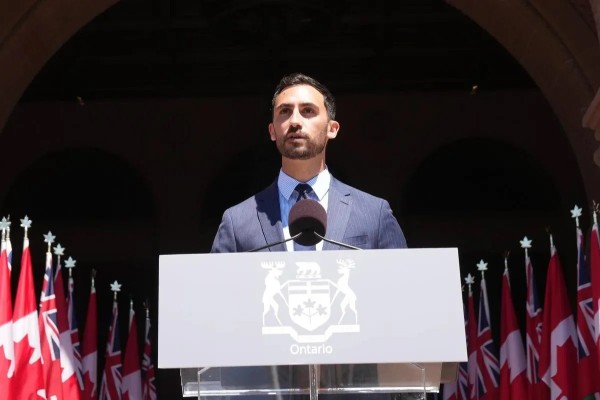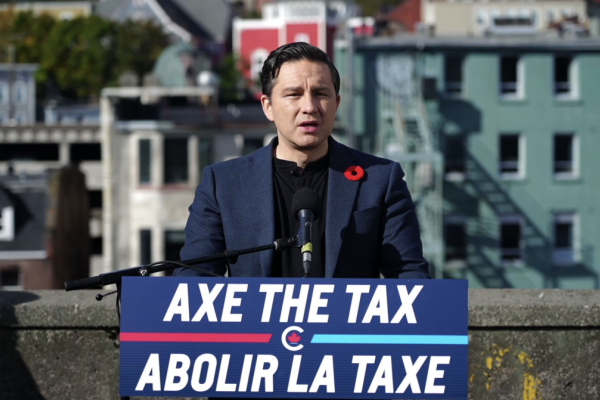For Ontario’s political establishment, cutting ‘welfare dependence’ means making the poor desperate
Successive Tory and Liberal governments have sought to push low income people off assistance and into the labour market

Ontario Progressive Conservative leader Doug Ford reacts after winning the Ontario provincial election to become the new premier, June 7, 2018. Photo courtesy the Toronto Sun.
Recurring proposals by the Ford government to stop social assistance “dependence” reflect a long history of Liberal and Tory governments alike, working to make income support programs less dependable.
In all cases, the aim of these cuts is to make the poor destitute and to make workers afraid.
The new ‘transformation’
Not content with clawing back federal COVID-19 support from social assistance recipients, leaked memos signal that the Ford government is proposing new ways to “decrease dependence.”
The current plan will see Ontario Works and Ontario Disability Support Program employment services contracted out, in some cases to private “welfare-to-work” firms. These firms will be, according to the documents, tasked with moving targeted shares of low income people off the roles and into the “labour market.”
According to the Ford government’s assistant children, communities and social services minister the changes aim to get the “Ontario economy back working again.” That, however, comes without any apparent concern for what kind of work, if any, the recipients find. In all likelihood, the changes will further erode recipients’ wellbeing—to push those who can to accept any work at any wage and leave those who cannot even more destitute.
Those ‘associated with social agencies since birth’
Concern over so-called “welfare dependence” was fairly common even through the post-war boom, as Ontario’s long-ruling Progressive Conservatives sought to adjust social expectations and balance expenses.
But, with the crises of the 1970s, the poor were easy targets for cuts. Those pushing them were remarkably clear that slashing “dependence” meant making programs less dependable.
In November 1975, this discussion took a particularly extreme turn. The Bill Davis government’s Special Program Review uncovered $1.6 billion in potential “savings”—provided the PCs fired healthcare workers, raised tuition, increased health premiums and stopped supporting the children of “welfare parents.” Specifically, the review suggested that mothers who received social assistance should either be “sterilized or excluded from the welfare system.”
Thereafter, former PC Justice Minister Gordon Walker called for work requirements and support cuts across Ontario, in his book, A Conservative Canada.
“A good many people have been associated with social agencies since birth,” Walker claimed. “We will have to be firm about this… Governments must learn to say ‘no’ to those who want to live off the taxpayer.”
Still image from a 1995 Mike Harris election advertisement.
The ‘Dickensian’ 1990s
In opposition, the PCs were even more eager to demonize the poor, with the help of right-wing think tanks.
In 1994, PC MPP Ted Arnott credited a social assistance review board youth counselor named Rico Sabatini with tipping him off to a local case of supposed welfare irregularity. A sixteen-year-old girl was “receiving welfare” without explaining why she couldn’t live with her parents—she had, apparently, neglected to file any “allegations of abuse.”
PC Party leader Mike Harris remarked, “What we are finding out now is case after case of this,” and pledged to crack down on recipients.
In the 1995 campaign, Harris proposed a “mandatory workfare program” to “force” recipients, especially “single welfare parents with children,” to enter the labour market—paid or unpaid. According to Harris, this meant “breaking the cycle of dependence.” It also came with a 21.6 percent cut to social assistance rates.
As the PCs returned to power in 1995, Sabatini co-wrote a policy paper for the Fraser Institute, titled Welfare — No Fair: A Critical Analysis of Ontario’s Welfare System. Citing Losing Ground by Charles Murray of the American Enterprise Institute, the report argued that “generous” welfare programs across Ontario were creating a “growing underclass” of illegitimate children—especially “among blacks.” To rectify the problem, the report suggested “decreasing the attractiveness of the system” and tightening eligibility.
An earlier report, The Causes of Poverty, also cited Losing Ground to claim that Ontario’s welfare programs create “perverse incentives” for “illegitimate births” and “dependency.”
Losing Ground is sometimes presented as Murray’s less hateful tract, relative to his subsequent book The Bell Curve. This is false. Losing Ground also deals heavily in long-debunked race science and white supremacist aims. The chapter, “Being Poor, Being Black,” claims that anti-poverty programs, far from helping Black Americans, cause an explosion in “illegitimate births,” delinquency, and “violent crimes.” In the footnotes, Murray suggests that this reflects the findings of Pioneer Fund–backed psychologist Arthur Jensen, in his book Straight Talk About Mental Tests. Here, according to Murray, Jensen elucidated “the reality of racial differences in tests of cognitive skills” and explained why Black people are, supposedly, prone to welfare dependence and criminality. Murray’s solution to the problem of “dependency” was to cut them off: “Scrapping the entire federal welfare and income support structure for work-aged persons.”
Murray has long found friends on the Canadian right. Aside from his explicit racism, his proposals to cut “dependency” are unique in that they do not seriously propose to lift people out of poverty. Murray’s proposals aim simply to ensure that the poor are fewer in number.
One could argue that this line of thinking has been highly influential. The workfare program that followed, in Ontario as elsewhere, undoubtedly killed poor people. Today, many who try to survive on the paltry support offered by ODSP openly contemplate Medically Assisted Dying (MAiD). Yet, the cuts remain firmly in place and eligibility continues to be tightened.
The chain gang
Tom Long, co-chair of the 1995 Tory campaign, told the Ottawa Citizen at the time the backlash was essential to the party’s campaign: “The minute welfare abuse came up these people locked on and they really got into the discussions in a way I’ve never seen before.”
This was supported by much of the media. In her 1995 account of the Harris campaign, Right Turn: How The Tories Took Ontario, Queen’s Park Toronto Sun columnist Christina Blizzard recounts that, on the party’s press bus, a taped version of “Chain Gang” by Sam Cooke “played loudly as a background to the Tories’ workfare plan.”
Through the early 1990s, the Sun published almost daily accounts of “welfare fraud” and “disturbing trends” among “sole support parents.” In its editorial pages, it also applauded the sweeping cuts pushed by the Harris Progresive Conservatives. This continued throughout the Harris years. For example, Blizzard’s column, “Breaking the poverty cycle,” argued:
To enter into parenthood single, as a lark, because you just felt it would be a fun thing to do, is impossibly selfish. We compound their [the parents’] folly by telling them not to bother learning how to feed their children a nutritious breakfast. Don’t worry, we say. Send your kids to school and we’ll set up a breakfast program.
Protestors rally in downtown Toronto against the Mike Harris government, which slashed social assistance rates by 21.6 percent in the mid-1990s. Photo courtesy the Ontario Coalition Against Poverty.
Labour ‘flexibility’
Federally, meanwhile, the Liberal government was also cutting transfers to the provinces, especially those helping fund income support programs, starting with a freeze in 1994. Around that time, the International Monetary Fund prepared a “finely detailed” Structural Adjustment Plan for Canada. A leaked version of the plan, likely prepared with the assistance of Finance officials, claimed:
Shared-cost funding for social welfare has encouraged rapid growth in provincial welfare spending, leading to concern that the generosity of social assistance programs has impeded re-entry of low-income individuals into the labor force. Moreover, Canada Assistance Plan (CAP) grants have not necessarily evolved according to provincial need, and may have impeded the adoption by the provinces of innovative forms of social assistance. Cuts in CAP transfers could assist fiscal consolidation and promote the adoption of efficiencies at the provincial level.
The main transfer program, the Canada Assistance Plan, was dismantled soon after and total funding was cut by about 40 percent between 1995 and 1997. Not only was this meant to save funds and establish Canada as, what the Trudeau government boasts today is “the most decentralized country in the OECD”—it also included a grimmer proposal: ‘labour flexibility.’
A subsequent Liberal policy book advised cuts to Canada’s “generous” assistance programs which, supposedly, “harbour features that can discourage active search for work” and act as a “disincentive” to accepting lower wages. Alongside cutting funding, the federal Liberals also freed the provinces to adopt more stringent qualification standards to further push low income people off the assistance programs—and, across Canada, they largely did.
The cuts after Harris
From 2003-18, the Ontario Liberals continued to errode anti-poverty programs, in line with provincial Tory precedent and federal standards.
As Jamie Peck observed in Workfare States, the Liberal plan to “fix workfare” was just to slightly increase “private sector participation.” Social assistance rates, however, never recovered—with the Liberals even introducing “freezes” as part of their post-2008 austerity program.
In between, the Liberals further cut component benefits like the Special Diet Allowance, the Work-Related Benefit and others.
Various Liberal ministers similarly repeated conservative language bemoaning the “welfare trap” and long-term welfare “dependence.” Yet, as the Canadian Centre For Policy Alternatives noted, the same ministers allowed the gap between what benefit recipients received and the official poverty line to grow dramatically. While the gap for a single person on the equivalent of OW in 1994 was 10 percent below the poverty line, the gap increased to 53 percent in 2002 and, then, to 59 percent in 2014. For those on ODSP, the gap increased from 19 percent in 2002 to 33 percent in 2014.
All told, while ODSP and OW rates rose 20 percent from 2003-2017, inflation rose 25 percent.
The “basic income pilot project,” introduced at the end of the Wynne government, was designed with the help of former Ontario Tory guru Hugh Segal. The pilot sought to provide recipients with new “incentives to work”—both by reducing work income clawbacks, by cutting dental and other benefits and by clawing back Employment Insurance and pension benefits. A follow up study showed that most recipients did not see any substantial increase in their incomes.
According to Wynne, her only regret is that her government did not introduce it sooner.
The Ford government (so far)
Coming into office, the Ford Progresive Conservatives cut social assistance by 1.5 percent, tightened disability eligibility and increased the clawback rate for income earned while working. While the latter idea was quietly dropped, experts warned it would make thousands of people homeless.
According to Ford’s first Social Service Minister Lisa Macleod, when she wasn’t cutting support for autistic kids and demonizing refugees, the existing system had to be overhauled, and by extension benefits had to be overhauled to stop the “cycle of dependence.”
While Macleod was quietly dismissed to the Ministry of Tourism, the logic has not changed. Not only has the government clawed back COVID-19 benefits from recipients, it is now, as the current documents suggest, looking for ways to push low income people off assistance and into the labour market.
In no case has talk of reducing “dependence” made the program more compassionate. Reducing “dependence,” in a capitalist society where a layer of the population is deprived, can only mean depriving them further.
Mitchell Thompson is a writer, editor and occasional radio producer based in Toronto.










